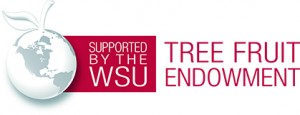Co-sponsored by NW Cherry Growers and WSU Extension a combination of live webinar and on-demand videos were offered in January 21, 2021.
Cherry Markets
Marketing Cherries Internationally During a Pandemic
In the foreign markets, the 2020 Northwest cherry crop found itself faced with numerous challenges such as closed borders, city lockdowns, lack of air transportation, a strong US dollar, limitation on retail promotion activities, import tariffs, and a cherry crop volume reduction. Keith Hu, Northwest Cherry Growers gives an update at Cherry Institute 2021.
Domestic Market: The Pandemic Powerhouse
A guided walkthrough of the North American consumer and retail promotion programs for the 2020 cherry season, including new research looking at the rise of online shopping and the possibilities of digital marketing. This past season may have been unprecedented, but all indications point to many variables that will remain for years to come. Watch and learn how the Northwest Cherry Growers are positioning their growers to take advantage of these market opportunities. Presentation by James Michael, NW Cherries at Cherry Institute 2021.
2020 Northwest Cherry Season by the Numbers
B.J. Thurlby, Northwest Cherry Growers describes the 2020 Cherry Marketing Season at NW Cherry Institute 2021.
Horticulture
Blue Orchard Bees for Improving Cherry Pollination
Drs. Theresa Pitts-Singer and Lindsie McCabe will talk about pollination using the blue orchard bee (Osmia lignaria) in Washington cherry orchards. Dr Pitts-Singer will introduce the blue orchard bee’s biology and foraging pattern that makes it an ideal candidate for being a great cherry pollinator. Additionally, Dr. McCabe will go through a two-year case study showing the efficacy of using blue orchard bees in commercial cherry orchards. She will also discuss the survey results from the 2020 meeting survey. After you listen to this year’s presentation please fill out the new survey. https://form.jotform.com/210074939706156
Orchard Systems for Cherry Efficiencies and Profits
Presentation by Greg Lang, Michigan State University, Cherry Institute 2021. The introduction of vigor-controlling rootstocks for sweet cherries in the late 1990s led to a decade of physiological research to understand how to successfully grow big cherries on small trees, concomitant with explorations of new ways to train sweet cherry canopies to improve within-canopy light distribution, fruit quality, and potential partial mechanization of orchard tasks. In 2010, the NC-140 rootstock research project scientists initiated cooperative trials across North America to examine four distinct sweet cherry canopy architectures on a range of precocious, vigor-controlling Gisela rootstocks. This presentation will summarize the 10-year results of that trial, which increasingly appear to be conducive to facilitation of the recent rapid advances in orchard sensing and robotic technologies as well as simply greater precision in production and efficiencies when human labor is still required.
X-disease and Little Cherry Virus
X-disease and Little Cherry Disease Introduction and Importance
A brief introduction to X-disease and Little Cherry Disease pathogens, symptoms, vectors, distribution and economic impacts by Tianna DuPont, WSU Extension at Cherry Institute 2021.
Symptoms and Biological Effects of X-disease and Little Cherry Disease on Sweet Cherry Varieties
Scott Harper, WSU Plant Pathology describes symptom progression of X-disease and Little Cherry Disease on different sweet cherry varieties.
X-disease Vector Management: Part 1
Tobin Northfield, WSU Entomology describes ID, trapping, and recent research for leafhopper vectors of X-disease phytoplasma. Cherry Institute 2021.
Tree Removal for X-disease and Little Cherry Disease
General tree removal recommendations and new trial results presented by Cody Molnar, WSU ITT Extension and Tianna DuPont, WSU Extension. Cherry Institute 2021. Sponsored by NW Cherry Growers and WSU Extension. Videography and production Nick Dirk.
WSU Physiology program update
Flower, Fruit Set and Pollination
Matthew Whiting, professor at Washington State University addresses: fundamentals of flowering and fertilization; pollenizers + pollinators; S-alleles and compatibility; environmental effects on flowering and fruit set; practical strategies for optimizing fruit set.
Sweet cherry harvest efficiency trials
Dr. Matthew Whiting, Washington State University describes several years of studies on sweet cherry harvest efficiency.
Cold Damage in Tree Fruit – An Overview
Dr. Matthew Whiting, WSU professor, presents an overview of cold damage in sweet cherry. The Stone Fruit Physiology program at WSU has investigated tree fruit hardiness for nearly two decades. The webinar covers recent research highlights and provides a demonstration of cold damage assessment.
New Technology for Reducing Cold Damage
In this video, New technology for reducing cold damage, Brent Arnoldussen, WSU PhD candidate in the Horticulture Department, gives a research update of his project on plant-based dispersions as an effective sprayable frost protectant.
Cherry Powdery Product Resistance
Cherry mildew has been quickly evolving resistance to key fungicides in Washington. Dr Gary Grove describes new research which has found that resistance to group 3 and 11 fungicides in all production regions as well potential as resistance in other groups.
